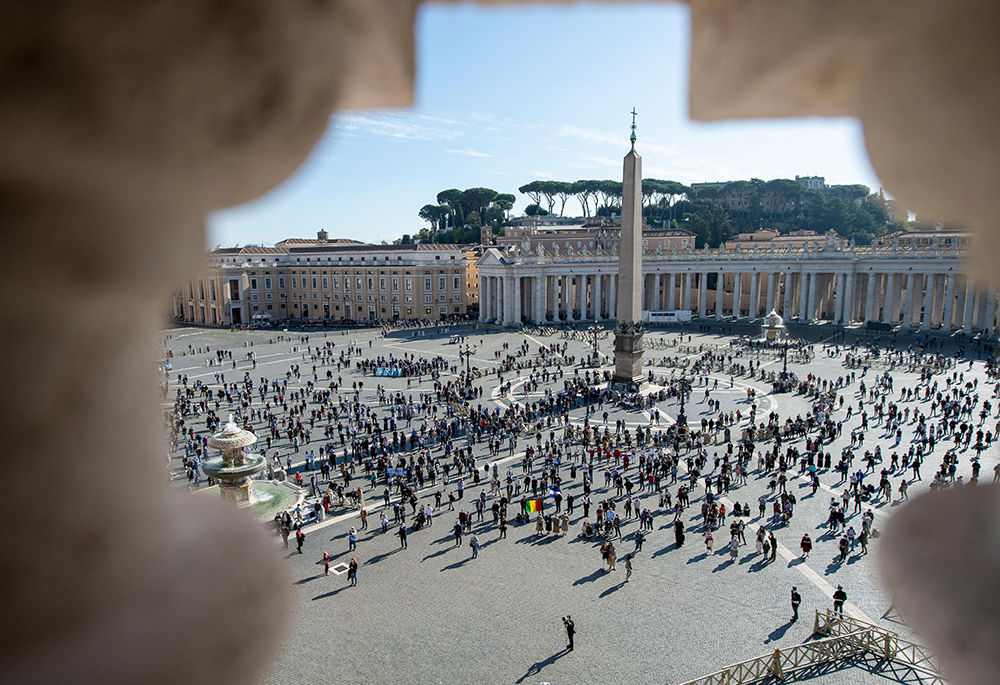
People in St. Peter's Square attend Pope Francis' recitation of the Angelus at the Vatican Nov. 8, 2020. The pope said people sometimes forget that life's ultimate purpose is preparing for the kingdom of heaven. (CNS/Vatican Media)
When I was a kid, Mom used to sing this ditty to me: "Mother, Mother, may I go out to swim? Yes, my darling daughter. Hang your clothes on a hickory limb, but don't go near the water." (Would it have been different had I been a boy? Perhaps, "Yes, my beloved son. Take off your clothes and dive right in, I want you to have fun.")
That time is long past. Now I can swim when I want and instead find myself bamboozled by Isaiah who tells us, "Seek while God can be found!" and quotes God as saying, "My thoughts are not your thoughts . . . as high as the heavens are above the earth, so high are my ways above yours." What are we to do? Where are we to seek God? And ultimately, why?
Responding to, if not exactly answering, this question, we have today's parable of the landowner and the day laborers who got paid equally, no matter how long they worked. Except for the prodigal son, few parables disturb people more than this one. It's not fair. Who wants a kingdom of heaven that runs on this sort of rule?
Really, what's the point of spending oneself all day if people who only work an hour get the same reward? It reminds me of the story of Constantine. They say that in the year 312, Constantine had a vision of a cross and the phrase, "In this sign, conquer." After winning a key battle under the sign of Christ, he and another emperor issued the Edict of Milan, legalizing Christianity. While Constantine claimed to believe in Christianity, he realized that its moral demands would have hindered his style — activities like the murder of his wife and son — so he waited to be baptized until he was on his deathbed. Forgiveness of sin and a straight path to heaven! Was he following the moral of this week's parable?
One line in the parable of the vineyard workers suggests a key to understanding it. Replying to the disgruntled folks who "bore the day's burden and the heat," the owner asked, "Are you envious because I am generous?"
Let's take a look at the workers' envy. What did they want from the owner? It seems they had no concern about the vineyard itself, only the salary. Like hired shepherds, they were contract workers, they had no stake in the produce; any job would have been the same to them as long as they received the payment they thought they deserved.
This is not to say that the latecomers (and Constantine?) were any more sincerely committed to the owner and the crop. The generous proprietor might not have even expected their loyalty. He focused at least as much on the good of the workers as on the work itself. None of the workers had more need of a wage than others; the families of those who had waited all day to be hired would be just as hungry as the families of those who worked all that time. The owner gave all of them what they needed to survive.
Advertisement
Taking this one step further, we might ask who among the workers might have cared as much about the landowner as he cared for them? A worker who is identified with the owner shares his care for the vineyard. For that person, the work itself is a reward and the pay is just one dimension of belonging to a group with a shared project. A worker who shares the owner's motivation becomes one with the owner.
This thinking may help lead us to a better understanding of the God whose thoughts are not our thoughts and whose ways are far above ours. Sometimes we look at religion as a transactional affair: If we do good, we'll get rewarded, if not, we'll be punished. Thus, like Constantine, we shoot for the best we can get with the least disturbance to other priorities.
Jesus said that this parable was about the kingdom of heaven — a realm that doesn't operate as a transactional system. This parable introduces us to an owner who cares for both workers and the vineyard, an owner criticized primarily for his generosity. This is the sort of owner that one can trust to look out for the common good. This owner seeks others who will share his priorities, who can catch some of his spirit. In Paul's words, he looks for people who will live for something more than themselves.
Isaiah left us asking how to find God. Jesus' parable of the owner and workers suggests that getting caught up in God's work will reveal who God is and draw us into the joy of living generously. That's more than fair.
